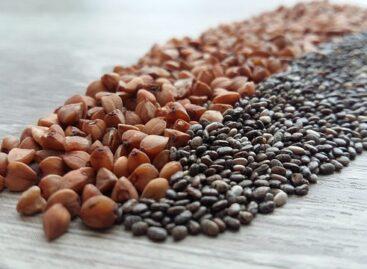Extraordinary conditions have developed in field crop production
Extraordinary conditions have arisen in Hungarian arable crop production due to this year’s severe drought and the economic difficulties caused by the Russian-Ukrainian war – emphasized Zsolt Feldman, the State Secretary responsible for agriculture and rural development of the Ministry of Agriculture (AM) on Thursday in Budapest, at the press conference after the meeting of the Harvest Coordination Committee.

(Photo: Pixabay)
Zsolt Feldman said that due to this year’s drought, the crop averages dropped significantly during the summer harvest: instead of the usual 5-5.5 million tons of wheat, only 3.9 million tons were harvested. It was already apparent then that the fall harvest would also be a serious situation, he added. According to the state secretary’s information, the sunflower harvest is essentially finished, the farmers harvest about 1.1 million tons of sunflowers from an area of 689,000 hectares, the average yield is more than a third less than the average yield of the last five years. The soybean harvest is at 60 percent, and according to the current state, the harvest will be 25 percent less than the average of the last five years, which is expected to be around 130,000 tons by the end of the year.
In the case of corn, the harvest is at 40 percent, the state secretary concluded
As he said, the farmers reported an average yield of 3.1 tons per hectare from the areas harvested so far, but the final figure still depends to a large extent on the yield of the remaining corn fields, he explained. He noted: the extreme drought caused a significant crop loss in corn culture at the EU level as well. It appears that Europe will make up for the lost crop volume through imports, of which Ukraine will be a significant source. The state secretary emphasized: the consequence of this year’s historic drought is that Hungary will become a net importer of corn in the current financial year, and the amount of imports will be determined according to the needs of the domestic market players. It can already be seen that 200,000 tons of grain and oilseeds are imported into the country per month based on domestic animal feed and industrial user needs. In order to ensure domestic security of supply, the government maintains the export notification obligation for export items – the state secretary indicated. Zsolt Feldman said that in recent decades, Hungarian agriculture has not faced difficulties similar to the current one, nor that it will have to change its traditional 5-6 million ton grain exporter position to a net importer position in the next period. The state secretary reported that autumn sowing has begun, and the sowing area has increased significantly. Based on sowing intentions, the sowing area of winter wheat is 12 percent more, the planned sowing area of barley will increase by one quarter compared to last year, and it is expected that the sowing area of rapeseed will decrease by one quarter.
Tamás Petőházi, the president of the National Association of Grain Growers, spoke about the fact that agriculture was not only lacking rainfall, but the plants were also suffering from severe heat stress. The level of river waters has dropped a lot, the autumn plants were mostly destroyed because they did not have access to an adequate amount of water due to the decrease in ground water. According to Tamás Petőházi, producers are reassured that they can work together with the department on a daily basis to deal with the difficult situation that has developed.
MTI
Related news
CBAM causes market disruption
🎧 Hallgasd a cikket: Lejátszás Szünet Folytatás Leállítás Nyelv: Auto…
Read more >Related news
EY Businessman of the Year: Tibor Veres is the grand prize winner, six special awards were also given out
🎧 Hallgasd a cikket: Lejátszás Szünet Folytatás Leállítás Nyelv: Auto…
Read more >dm’s Together for Babies program continues this year
🎧 Hallgasd a cikket: Lejátszás Szünet Folytatás Leállítás Nyelv: Auto…
Read more >Storck Hungária: new sales manager has arrived
🎧 Hallgasd a cikket: Lejátszás Szünet Folytatás Leállítás Nyelv: Auto…
Read more >









